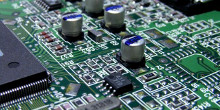NHR PerfLab Seminar: Processing very large image volumes with the adaptive particle representation (January 30, online)
Title: Processing very large image volumes with the adaptive particle representation (online)
Speaker: Prof. Dr. Ivo Sbalzarini, Max Planck Institute of Molecular Cell Biology and Genetics, Dresden
Date and time: Tuesday, January 30, 2024, 2:00-3:00 p.m. CEST
Location: via Zoom: https://fau.zoom.us/j/68603607738
Slides: HPC-APR
Abstract:
As science becomes increasingly data-driven, large volumes of observational data are acquired in space and time. In systems biology, large volume data primarily come in the form of microscopy images. Progress in imaging technology nowadays enables observation of developing tissues and embryos at sub-cellular resolution over the entire timespan of development. This generates rich data sets with sizes routinely exceeding several Terabytes and ranging up to Petabytes. Visualizing, storing, and analyzing these images then becomes challenging. For this purpose, we developed the Adaptive Particle Representation (APR) as an alternative to pixels for representing images [1]. The APR exploits sparsity in the images to adapt the signal sampling to the image contents. This enables orders of magnitude reduction in storage. Since the APR is a signal representation, rather than a compression algorithm, images can also directly be processed and visualized as APRs [2], accelerating all downstream computation by the same factor. This enables image processing at a rate exceeding 1 TB/s on a single consumer GPU, allowing for real-time analysis and visualization of microscopy images. Applied to large biomedical imaging projects, such as whole-brain imaging, the APR has reduced overall processing times from several days to about an hour [3], enabling the first human brain imaging at cellular resolution.

Short Bio:
Ivo F. Sbalzarini is a Professor in the Faculty of Computer Science of TU Dresden, and he is a director of the Center for Systems Biology Dresden (CSBD). Since 2021, Ivo is the Dean of the Faculty of Computer Science. He alsois a tenured Senior Research Group Leader with the Max Planck Institute of Molecular Cell Biology and Genetics (MPI-CBG) in Dresden, Germany. He graduated in Mechanical Engineering from ETH Zurich, Switzerland, (Willi Studer Award) with majors in Computational Fluid Dynamics and Control Theory. He completed his doctorate (Dr. sc. techn.) in Computer Science at ETH Zurich (Chorafas Award, Weizmann Institute of Science, Israel) under the supervision of Prof. Petros Koumoutsakos with intermediate stays at Stanford University (USA) and at Caltech (USA). In 2006, Ivo was named Assistant Professor of Computational Science in the Department of Computer Science of ETH Zurich. In 2012, Ivo and his group moved to Dresden, where he became one of the founding members of the Center for Systems Biology and the Chair of Scientific Computing for Systems Biology. He also serves as Area Lead for Biomedical Data Science and AI in the Federal Center for Scalable Data Analytics and Artificial Intelligence (ScaDS.AI) and a Research Avenue Leader for Scientific Computing and Smart Microscopy in the DFG Cluster of Excellence “Physics of Life.” Ivo’s research interest focuses on computer algorithms for machine learning, data-driven modeling, and high-performance computing in image-based computational biology.
For a list of past and upcoming NHR PerfLab seminar events, see: https://hpc.fau.de/research/nhr-perflab-seminar-series/

